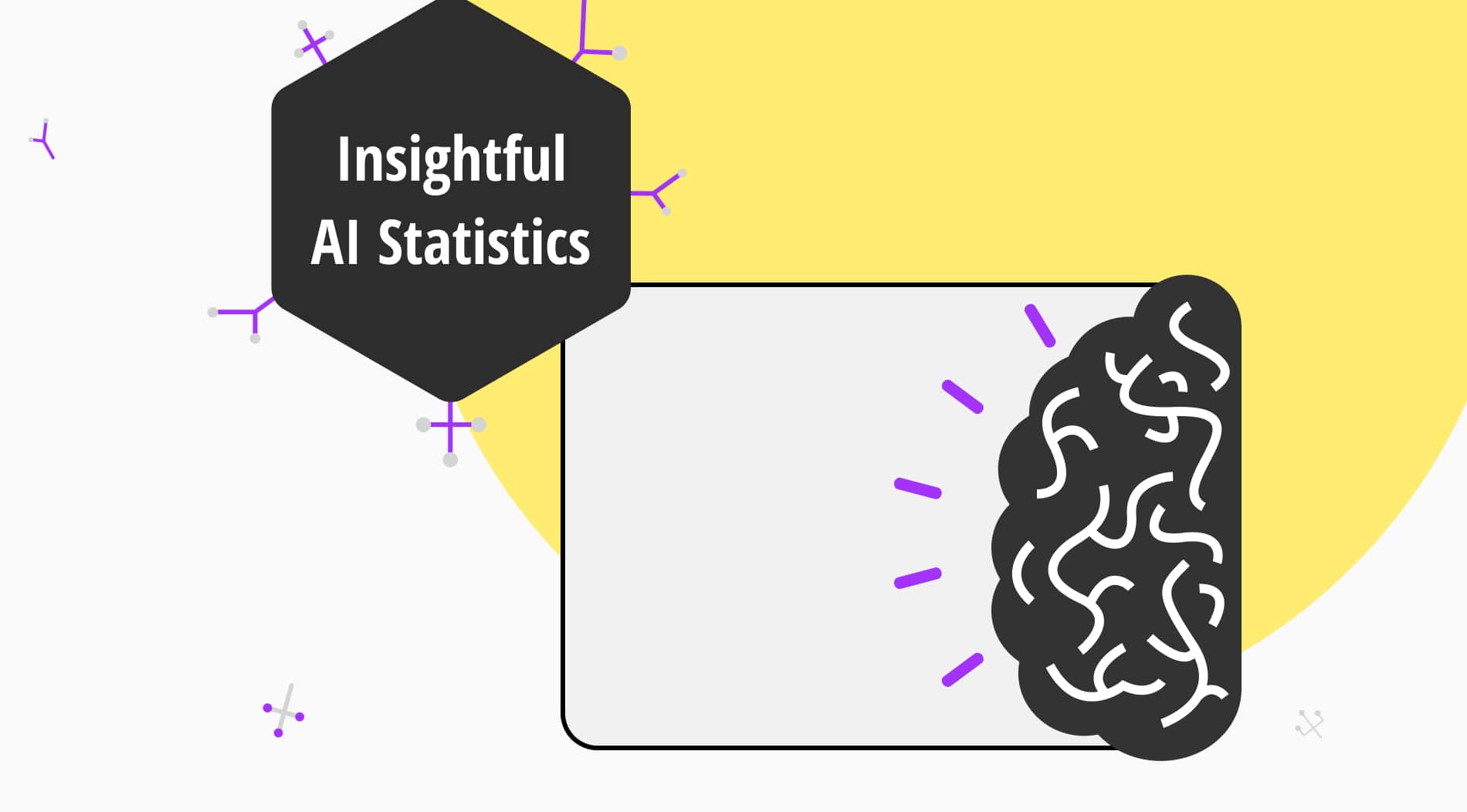In the last few years, the term artificial intelligence has become more popular. The place and importance of AI-based technology for both its users and companies are undeniable. If you are curious about AI stats and AI facts that concern many industries and want to know big data about it, this article is for you because you will get what you want!
In this article, we have gathered 60+ AI statistics you need to know, including statistics about artificial growth statistics, AI capabilities, chatbots, AI tools, AI developments, highlights about AI, key points to take away, and more!
Highlights about AI
Each year, the number of investments in AI by country is increasing. But have you ever wondered why AI matters this much? Before looking at artificial intelligence statistics, you need to warm up a little bit. In this section of our article, you will see top AI statistics and facts to have a general idea about artificial intelligence (AI), so here are them:
- In 1950, the first time when AI was used. It was used for chess but has been with us for decades.
- Self-driving cars are being developed by using AI.
- According to Time, nearly all data will be digital in 20 years, allowing AI to be used for decision-making and optimization.
- By 2025, AI will be used to aid in 9 out of 10 client contacts.
- There are already more than 4 billion voice assistants in use.
- AI software sales alone will total close to $100 billion globally by 2025.
- AI is anticipated to contribute $15.7 trillion to the global economy by 2030 (more than China and India's combined output).
60+ AI Statistics that will give you valuable insights
As we have discussed so far, data's importance is increasingly evident. If you want to decide your next move like a professional, you will need statistics, and that’s why we are here! If you want to approach the issue more firmly, here are the 60+ AI statistics that will give you valuable insights:
AI statistics about its impact
Now, nearly every business uses generative AI to grow their business faster. Since it has been requested frequently, the amount of allocated money for investment in a country has increased, too. In order to help you understand the implemented AI better, look at these AI statistics about its impact:
1. The potential impact of AI on the world economy is enormous. By 2030, AI is anticipated to contribute to the global economy at a range greater than that of China. (PWC)
2. More than China and India's combined output, AI is anticipated to contribute $15.7 trillion to the global economy by 2030. (PWC)
3. ChatGPT from OpenAI has experienced an unprecedented rise in popularity. Even ChatGPT, the most known AI tool, surpassed 10 lakh users in just five days following its launch in November 2022, according to OenAI. (Statista)
4. AI reports mentioned an outbreak of an unidentified kind of pneumonia before COVID-19 became a phrase all too frequently used in the healthcare industry. (OECD)
5. Over 20% of United States citizens have a smart speaker. (Statista)
6. There are already more than 4 billion voice assistants in use. (BusinessWire)
7. Elon Musk cautions that by 2025, AI services may suppress humans. (Independent)
8. Oxford University’s AI system can read lips with 93% accuracy, according to machine learning (ML). (BBC)
9. Google processes 6.9 billion daily search queries using worldwide AI technologies. (Bloggers Passion)
10. 90% of data is unstructured, making it impossible for businesses to concentrate on key data points without technology to process big data. (Forbes)
11. Some smartwatches use artificial intelligence to schedule handwashing sessions for nest cleanliness. (Apple)
12. Manufacturing firms are outperforming rivals thanks to AI. (Microsoft)
13. By 2025, AI will be used to aid in 9 out of 10 client contacts. (AI Business)
14. Nine out of ten businesses support AI to offer them an advantage against competitors. (MIT Sloan)
15. By the end of the decade, China will hold more than 25% of the global market of AI. (Facts&Factors)
16. For chatbot messaging, responses can reach 35-40%. In fact, the same article discovered that businesses using chatbots to reach an engaged audience could even see response rates as high as 90%. (Matthew Barby)
17. In the next two years, chatbots are predicted to save organizations $8 billion and 2.5 billion hours. (Juniper Research)
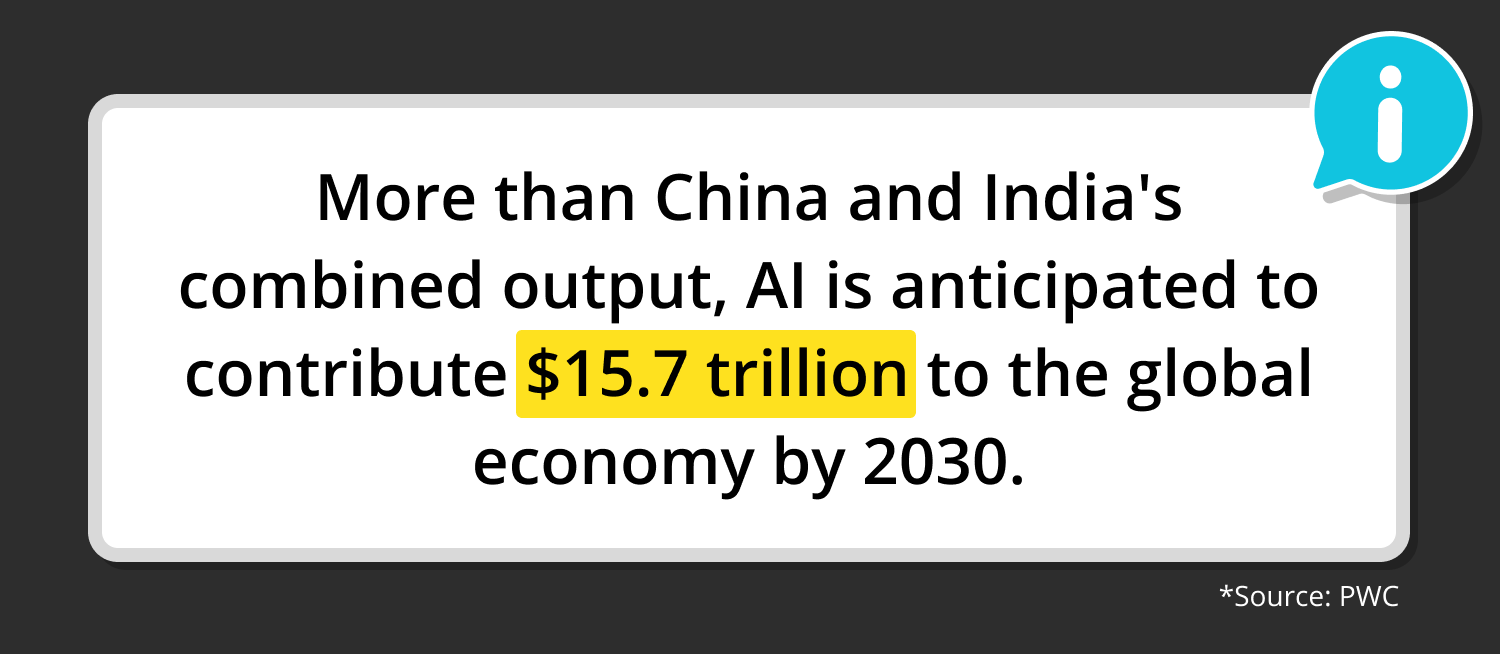
Source: PWC
AI statistics about its growth
Artificial intelligence industry growth can be easily noticed by businesses and companies in terms of success. The rates below prove how it is effective, and the numbers demonstrate the importance of AI and how it helps you grow bigger. So, you should definitely have a look at these artificial intelligence growth statistics:
18. From 2023 to 2030, the size of the global artificial intelligence market is anticipated to increase at 37.3% CAGR. By 2030, it is anticipated to reach $1,811.8 billion. (Grand View Research)
19. The NLP market share is anticipated to reach more than $345.7 Billion by the end of 2035. (Research Nester)
20. Patients will increasingly download and share their medical data during the next 5 years. (Markets and Markets)
21. AI software sales alone will total close to $100 billion globally by 2025. (Omdia)
22. In 2021, 57% of companies utilized AI/ML to enhance customer experience. (data robot)
AI Software Market Revenue Chart
23. Four out of ten marketers think that using AI in email marketing increases market revenue. (Statista)
24. According to recent studies, applying AI to sales can make 50% more leads overall, 60% fewer calls each minute, and results in up to 60% reductions in overall costs. (Harvard Business Review)
25. By 2020, 85% of clients received customer assistance without speaking to a human. (AI Businesses)
26. Fear of being laid off may be valid for employees in the UK’s manufacturing (46.4%) and whole & retail (44%) sectors. (PWC) (REST OF THE TABLE)
27. 93% of people would trust orders from a robot at work. (Oracle)
28. By 2030, workers in transportation and storage are most at risk from job automation, with 56.4%. (PwC)
29. Approximately 4 in 10 businesses planned to utilize AI in 2019. (Adobe)
30. By 2025, around 100 million people will be employed in the AI industry. (We Forum)
31. According to Statista, the market will continue to expand significantly; by 2027, it is anticipated to be worth about $454.8 million. (Statista)
32. By 2035, the manufacturing sector will benefit from AI to the extent of $3.78 trillion. (Accenture)
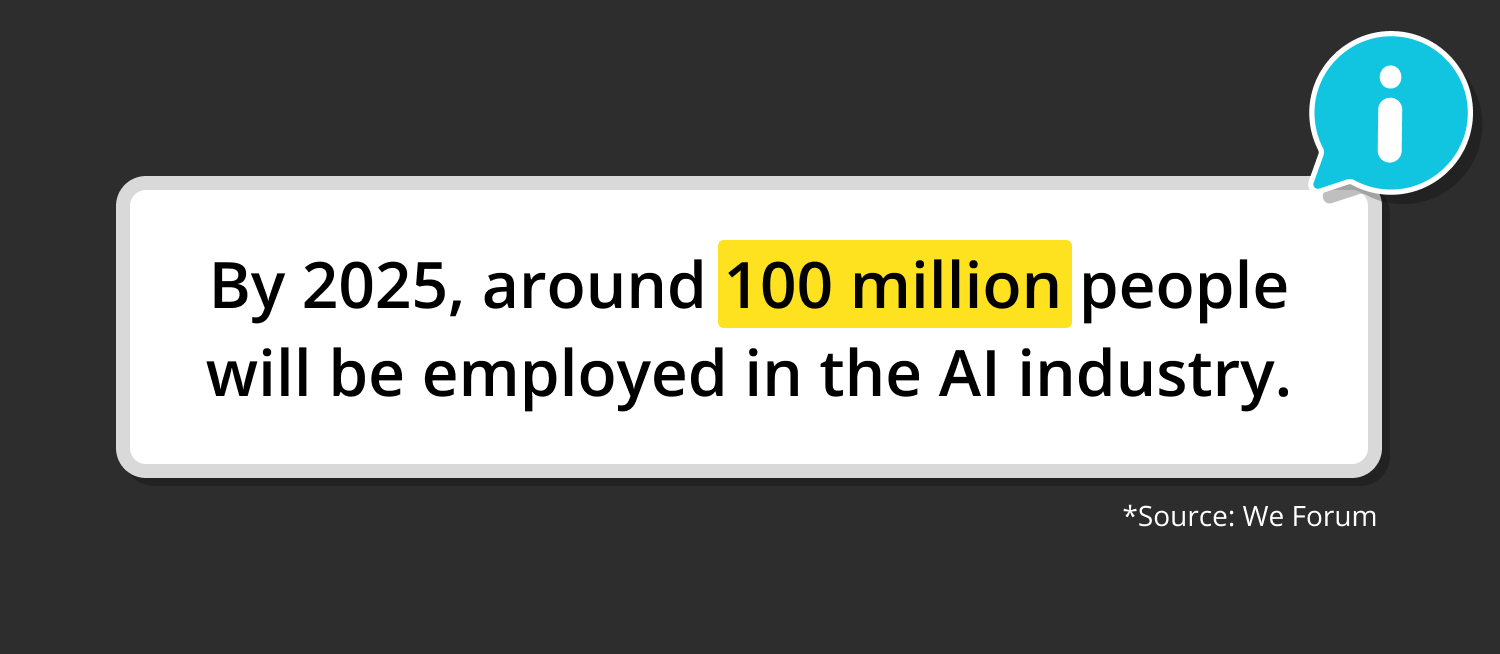
Source: We Forum
AI statistics about social media
Artificial intelligence is also an effective aspect of social media. By creating more engaging data, it will give you a hand in creating better social media platforms. To find interesting and eye-opening facts, you need to look at these AI statistics about social media:
33. 50 percent of American citizens want to know more about how generative AI is applied on social media. (Insider Intelligence)
34. The platform's overall time usage has increased by 7% as a result of AI recommendations. (Meta)
35. My AI chatbot on Snapchat received 10 billion messages from 150 billion users in the first two months of its inception. (Snapchat)
36. At a CAGR of 28.04% during the forecast period (2023-2028), AI in the special media market is anticipated to increase from USD 1.64 billion in 2023 to USD 5.66 billion by 2028. (GlobeNewswire)
38. In the first week after Llama 2’s release, Meta received 150,000 requests to download them. (Meta)
37. Neither Photoshop nor generative artificial intelligence (AI) photoshops of faces or persons should be utilized in social media advertising, according to 48% of study respondents in the United States in 2023. (Statista)
39. With 40% more than Llama 1, Meta’s open-source large language AI model Llama 2 was trained. (Facebook)
40. The market for artificial intelligence in social media, which was valued at $992.7 million in 2021, is expected to increase at a CAGR of 28.7% from 2022 to 2031 to reach $12 billion.
41. There are already over 300,000 chatbots active on Facebook Messenger alone. (Venture beat)
42. 97% of CEOs concur that machine learning (ML) and artificial intelligence (AI) will make it possible for businesses to evaluate social media data and insights more effectively. (Sprout Social)
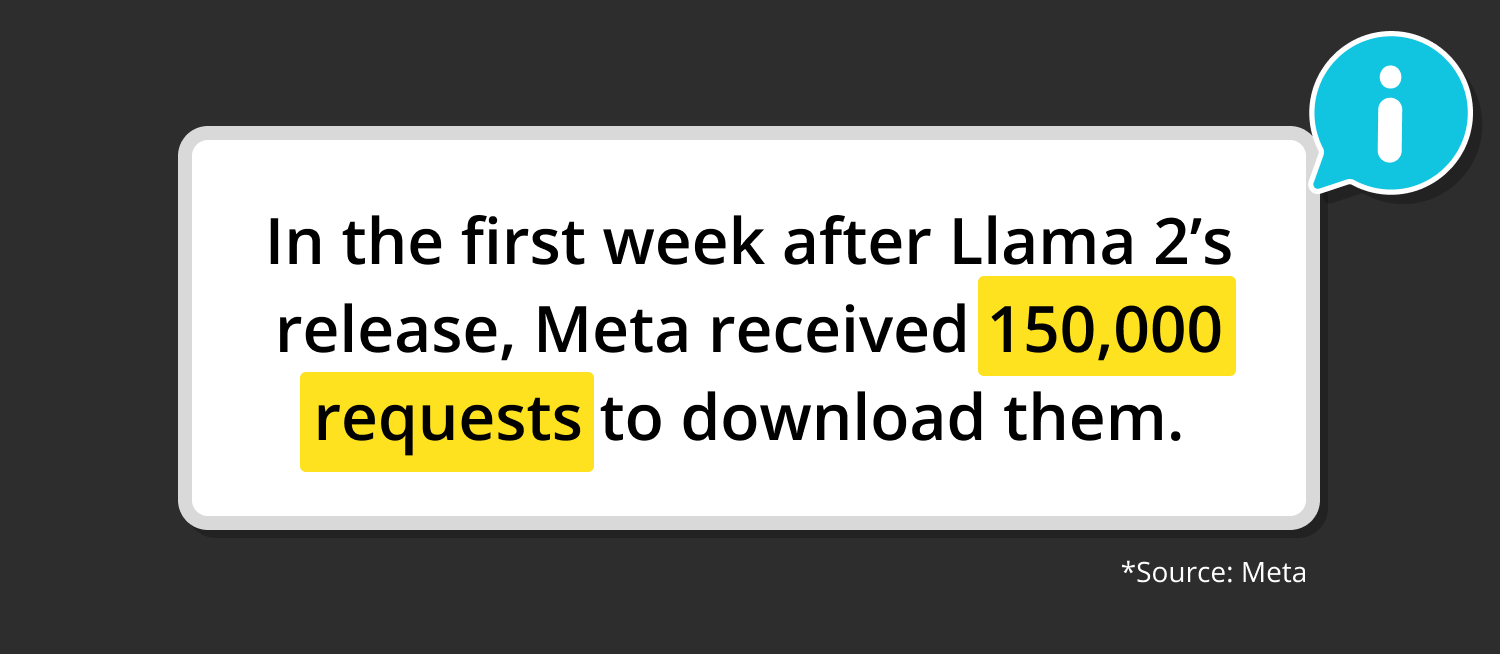
Source: Meta
AI statistics about trust
Despite its wide usage, artificial intelligence can create some debatable topics around its users. While some people trust the service they get from artificial intelligence, some of them are still approaching with suspicion. To observe and analyze better, have a look at these AI statistics about trust:
43. According to a 2017 survey, 76% of CEOs are concerned about the global AI market’s lack of transparency and the possibility of skewed biases. (PWC)
44. On any device, including smart speakers, smartphones, in-car systems, and more, voice assistants are used by 62% of Americans. (Nation Public Media)
45. 40% of executives concur that the costs associated with implementing cutting-edge AI systems and the specialists who operate them are now too high. (Harvard Business Review)
46. Google claims that its deep ML technology is 99% correct. (Google)
47. Nearly half of the employees (48%) are cautious about trusting artificial intelligence at work. (The Conversation)
48. In India, 76% of people accept and are willing to trust artificial intelligence (AI) systems. (Statista)
49. In Finland, 16% of people are inclined to trust artificial intelligence (AI) systems. (Statista)
50. According to 84% of the respondents, “being able to explain how their AI arrives at different decisions is important to their businesses.” (Forbes)
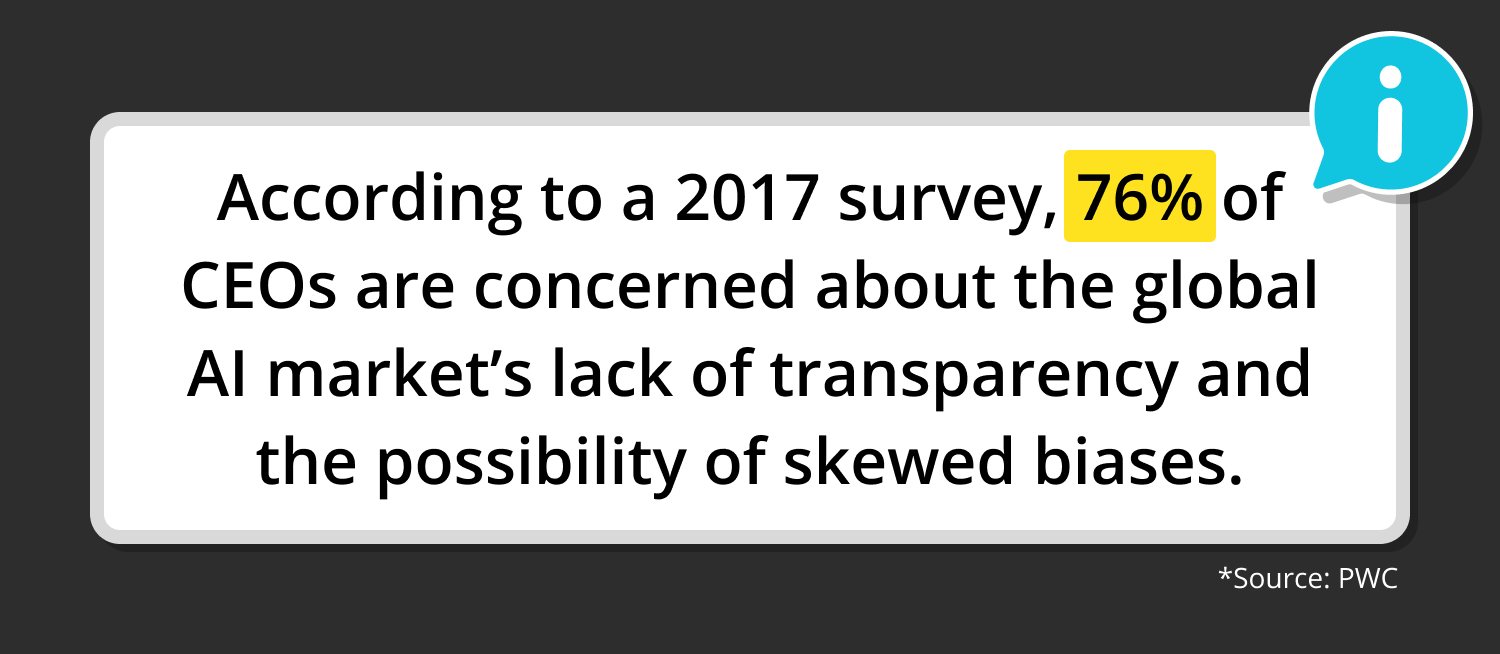
Source: PWC
Statistics about chatbots
Artificial intelligence has gained lots of tools in our lives, such as virtual assistants, algorithms, etc. Chatbot is one of them, which companies use a lot on their websites. Today, nearly all websites use chatbots, and the ones that use chatbots can easily observe their power. The statistics listed above about the chatbot will encourage you more. So, you need to review these statistics about chatbots:
51. For enhanced customer assistance, a $4.5 billion investment was made in chatbot integration across industries. (Opus)
52. At least 67% of people worldwide utilize chatbots for customer service. (invesp)
53. Chatbots are used by 70% of white-collar workers to do everyday activities and projects quickly and without any latency. (Gartner)
54. 40% of millennials use chatbots to inquire about sales, promotions, and impending reductions at the targeted retailer or for a particular item. (Marketing Dive)
55. If the question is adequately articulated, chatbots can promptly resolve 90% of complaints. (MIT Technology Review)
56. Only 9% of people want chatbots to disappear from businesses, yet the majority still prefer them. (userlike)
57. The use of chatbots for various leverage factors and notifications would result in the eCommerce market reaching $112 in revenues. (Juniper Research)
58. Kahoot!, a well-known online game, claimed that over 2 billion users utilized chatbots to ask questions while playing and received prompt, direct answers. (kindly)
59. Order monitoring increased by 30%, and chatbots employed in eCommerce sites helped deliver a smooth customer experience while purchasing. (kindly)
60. By 2025, it is expected that 95% of all customer interactions will be driven by AI. (Finance Digest)
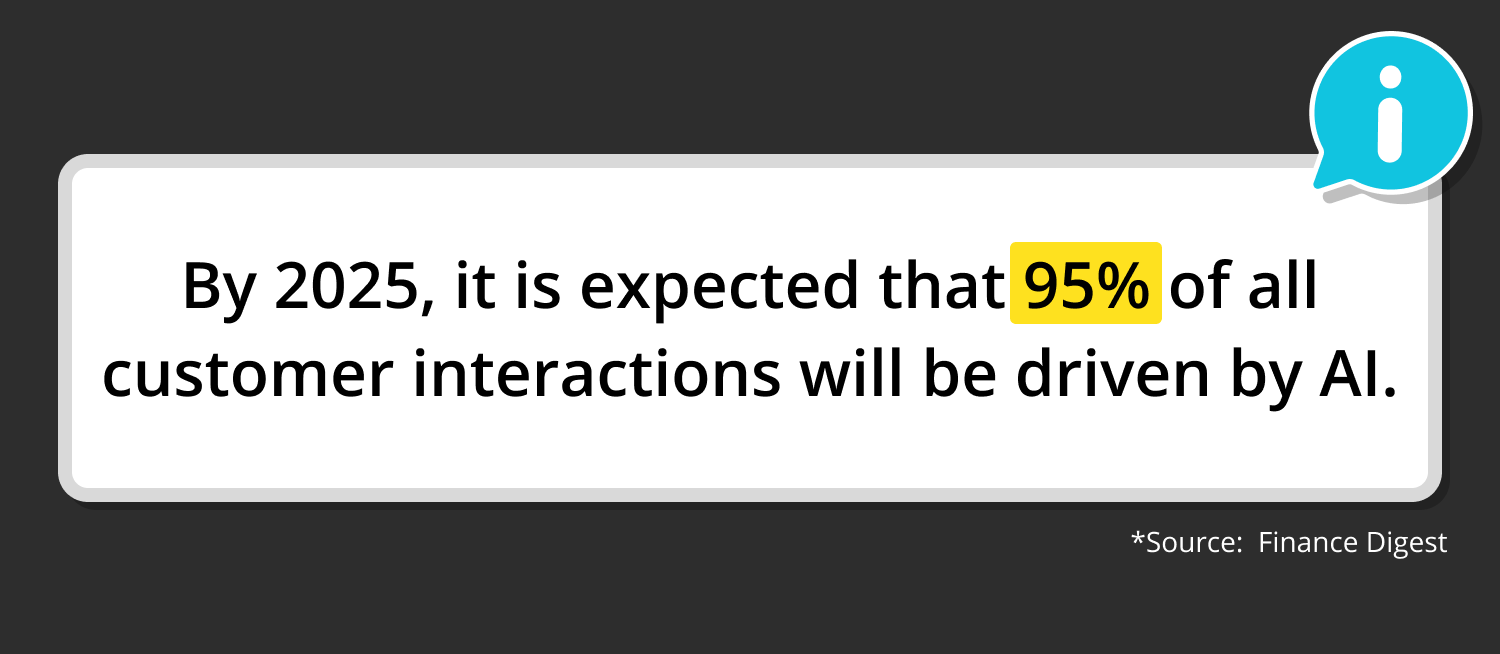
Source: Finance Digest
Key points to take away
You have seen the most important and eye-opening statistics about AI. As you analyze all of these artificial intelligence stats, you might think about a few things to keep in mind. Before beginning your research, you should consider the following important points:
- Do your own research: Each industry or business has its own methods for managing or providing AI tools. You may create your own survey to understand AI better and make better plans for the fastest growing.
- Make statistics visible: In this way, you will be able to comprehend the rates on graphs.
- Interpret the results: At the end of your study or research, you need to interpret the results, comment on them, and take notes on the important points.
As long as you analyze all these valuable statistics and pay attention to the key points given above, you can easily create a better plan and have a more promising future for your business or company. Now that you have all the necessary data, you know what to do and where to start!
Şeyma is a content writer at forms.app. She loves art and traveling. She is passionate about reading and writing. Şeyma has expertise in surveys, survey questions, giveaways, statistics, and online forms.
